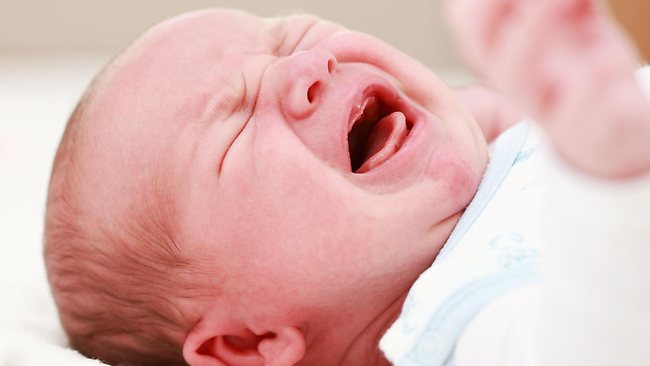Debate reignites around parents' right to have their sons circumcised
TO circumcise or not? It's an emotive question that confronts the parents of newborn boys across the world.

TO circumcise or not? It's an emotive question that confronts the parents of newborn boys across the world.
The surgical removal of the foreskin is a practice which has been undertaken for religious and cultural reasons for many thousands of years.
Research both supports and criticises the health benefits of the procedure which is estimated to be performed on about 15 per cent of infant boys in Australia.
The debate surrounding the practice has reared its head in recent weeks, following a German court's ruling of assault against a doctor who performed a circumcision on an infant.
Last month the Tasmania Law Reform Institute also recommended that circumcision of infant boys should be banned unless parents can demonstrate medical need or well-established religious or ethnic motives, while the American Academy of Pediatrics has published new circumcision guidelines in its journal Pediatrics.
The academy found the health benefits outweigh the risks of surgery, but fell short of recommending that the procedure be made routine for baby boys.
University of Sydney's Professor of Molecular Medical Science, Brian Morris, is an advocate for the practice.
He said research showed uncircumcised boys had a higher risk of urinary tract infections, inflammatory conditions, sexually transmitted infections, genital herpes, genital cancers and HIV.
"The benefits are massive ... we did a risk-benefit analysis and we found that the benefits exceeded the risks by well over 100/1," Prof. Morris said.
On the other hand, he said complications arising from circumcision were often minor and easily treated. These included minor bleeding or infection.
"The risks are minor ... if you analyse all the data it stands at about 1 per cent," he said.
He said the once-popular practice - which was performed on about 85 per cent of newborn boys in the 1960s - must be reinstated.
The World Health Organisation supports male circumcision for HIV prevention, and says research had suggested it can reduce the risk of heterosexually acquired HIV infection in men by approximately 60 per cent.
But, Dr Robert Darby, a medical historian who has written extensively about male and female circumcision, said evidence advocating the procedure was lacking.
"Most of the stuff that has been cited is from these very poor African countries which have very poor health levels," he said.
"What's going on there is simply not relevant to Australia.
"Australia has one of the lowest incidences of HIV in the world."
He said the practice had evolved in Britain as a measure to stop masturbation, which was seen to be morally wrong.
He said the foreskin was important for a man's sexual pleasure. "It's an integral part of the penis ... its function is that of all skin, which is to receive sensation," he said.
In June, a judge in Germany ruled the procedure amounted to "illegal bodily harm" and the "right of the child to bodily integrity" outweighed the parents' right to circumcise their son.
The decision caused outrage among religious groups, who declared it to be an "inappropriate interference with freedom of religion, " and other German officials have since spoken out in favour of retaining circumcision's protection under law.
Today, the University of Adelaide will host a debate surrounding the legalities of circumcision.
Anne Hewitt, a senior law lecturer at the university, said the German case was unlikely to ever happen in South Australia, because there was general support for the procedure here.
"There's very, very little regulation of male circumcision," she says. "There's no criminal sanction, there's no regulation, there's no provision about who can perform a circumcision or in what circumstances. Parents can consent on behalf of the children."
But she said the same was not true for other Australian states.
"SA is the only jurisdiction in Australia that actually specifies in what circumstances parents can consent to non-therapeutic medical treatment on behalf of their children," Ms Hewitt said.
"Parents can consent to harm being inflicted on their child if the nature of the harm and the purpose for which it is inflicted fall within limits that are generally accepted in the community."
In SA, the 2007 SA Health Elective Surgery Exclusions Policy governs non-medical male circumcision.
An SA Health spokeswoman yesterday said circumcision was deemed a "cosmetic surgery procedure" which was not available in South Australian public hospitals "unless they are assessed and justified on true clinical grounds". "This policy ensures public hospital elective surgery is prioritised to treat patients who have a medical need for surgery to improve their health," the spokeswoman said.
The Royal Australasian College of Physicians' position statement on the practice states that "the frequency of diseases modifiable by circumcision, the level of protection offered by circumcision and the complication rates of circumcision do not warrant routine infant circumcision in Australia and New Zealand".
"However, it is reasonable for parents to weigh the benefits and risks of circumcision and to make the decision whether or not to circumcise their sons," the statement says.
The University of Adelaide will today host a free lecture - called Circumcision a Crime? A critique of the legal regulation of genital cutting in Germany and Australia - at 1pm at the university's Moot Court Room in the Ligertwood Building.



